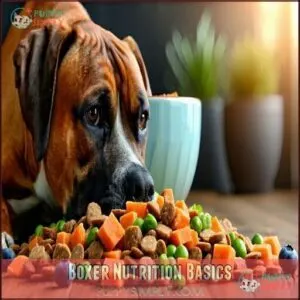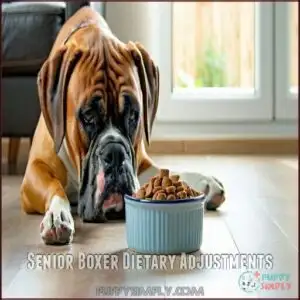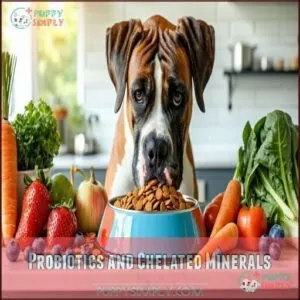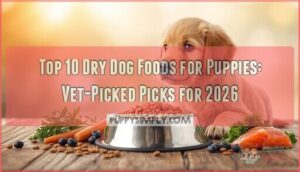This site is supported by our readers. We may earn a commission, at no cost to you, if you purchase through links.

Look for dog foods with lean animal proteins like chicken, lamb, or fish as the first ingredient.
Healthy fats, such as fish oil, promote shiny coats and joint health—important for their active nature.
Whole grains or fiber-rich carbs like brown rice or sweet potatoes keep digestion smooth.
Brands like Royal Canin Boxer, Taste of the Wild, and Blue Buffalo meet these needs well.
Always check for life-stage suitability, whether you’ve got a playful pup or a mellow senior, and remember that small details can make a big difference!
Table Of Contents
- Key Takeaways
- Boxer Nutrition Basics
- Boxer Life Stages
- Key Ingredients for Boxers
- 18 Best Dog Foods for Boxers
- 1. Royal Canin Boxer Adult Dry Dog Food
- 2. Taste of The Wild Bison Venison Dog Food
- 3. Grain Free High Protein Dog Food
- 4. Nulo Adult Salmon Grain Free Dry Food
- 5. Large Breed Puppy Food With Real Meat
- 6. Merrick Senior Chicken Dry Dog Food
- 7. Victor Super Premium Dog Food Nutra Pro
- 8. Natural Balance Lamb Brown Rice Dog Food
- 9. Hill’s Science Diet Large Breed Mobility Dog Food
- 10. Taste of The Wild High Prairie Dog Food
- 11. Blue Buffalo Adult Dog Food Chicken Brown Rice
- 12. Orijen Senior Dog Food Grain Free
- 13. JustFoodForDogs Chicken Rice Wet Dog Food
- 14. Nutro Ultra Adult Dog Food Trio Protein
- 15. Hills Science Diet Senior Small Breed Dog Food
- 16. Acana Lamb Pumpkin Dog Food
- 17. Open Farm Grain Free Wagyu Beef Dog Food
- 18. Portland Pet Food Mixed Wet Dog Food
- Choosing Boxer Dog Food
- Frequently Asked Questions (FAQs)
- What is the best dog food for a boxer?
- What are the top dog food options for dogs?
- Which dog food is best for boxers with allergies?
- What is the best wet food for Boxer puppies?
- What is the best dehydrated dog food for boxers?
- Can boxers eat dog food?
- Does a boxer need to eat special dog food?
- What are the 3 feeding stages of a boxer’s life?
- What’s the best dog food for an older boxer?
- When can I safely switch my boxer puppy to adult food?
- Conclusion
Key Takeaways
- Look for high-protein formulas with at least 18-22% quality animal protein like chicken, lamb, or fish to maintain your Boxer’s muscular build and fuel their active lifestyle.
- Choose foods with healthy fats, including omega-3 and omega-6 fatty acids, to support your Boxer’s skin health, reduce allergies, and promote a shiny coat.
- Consider your Boxer’s life stage when selecting food—puppies need growth-focused nutrition, adults need maintenance formulas, and seniors need joint support ingredients like glucosamine and chondroitin.
- Pay attention to digestive support ingredients like whole grains, fiber-rich carbs, and probiotics, as Boxers often have sensitive stomachs and specific digestive needs.
Boxer Nutrition Basics
Your energetic Boxer needs a protein-rich diet with at least 18% protein from quality animal sources to maintain their muscular build and active lifestyle.
A strong, energetic Boxer thrives on a high-quality protein-rich diet tailored to fuel their muscles and active lifestyle every day.
You’ll also want to include healthy fats and joint-supporting nutrients like glucosamine to address their breed-specific health concerns.
Such concerns include hip dysplasia and skin allergies, which can be mitigated with the right nutrients and care.
Protein Requirements for Boxers
Your Boxer’s muscles need proper fuel to thrive.
These athletic dogs require 18-22% protein in their diet, coming from high-quality sources like chicken, beef, or fish.
Protein digestibility factors matter too—look for whole meats or meat meals as primary ingredients in your boxer dog food.
This helps with muscle maintenance and energy balance while addressing potential allergy concerns common in the breed.
Healthy Fats for Boxers
Boosting your Boxer’s diet with healthy fats supports their skin, joints, heart, and coat.
Omega-3 benefits are key for reducing skin allergies and improving joint health.
To include healthy fats in their nutrition:
- Add fish like salmon for omega-3.
- Mix in flaxseeds for fat metabolism and coat quality.
- Use coconut oil sparingly for energy and heart health.
Carbohydrates and Fiber for Boxers
Let’s shift focus to carbohydrates and fiber, key for energy balance and digestion.
Digestible carbs like sweet potatoes or oats are gentle on sensitive stomachs, fueling your Boxer’s lively personality.
Natural fiber sources, such as pumpkin or brown rice, improve stool quality and overall health.
When choosing dog food, look for high-quality carbohydrates and natural fiber for superior nutrition.
Boxer Life Stages
Boxers have unique nutritional needs at every stage of life, from energetic puppies to active adults and finally, slower-paced seniors.
Boxers thrive with tailored nutrition that evolves from bounding puppies to energetic adults and gracefully aging seniors.
Understanding these changes helps you choose the right food to keep your Boxer healthy and happy.
Puppy Nutrition and Growth
Growing Boxer puppies need careful calorie control and balanced puppy nutrition to support their rapid growth milestones.
Choose large breed puppy food meeting AAFCO standards with rich puppy protein for muscle and joint development.
Maintaining steady puppy growth guarantees strong bones without strain.
Consider specialized food options for healthy health, and prioritize quality ingredients designed for Boxer puppies to fuel their energy without overloading their growing bodies, ensuring balanced nutrition.
Adult Boxer Diet Requirements
As your Boxer grows, their diet shifts to support energy, muscle, and overall health.
Adult Boxers thrive on balanced meals with:
- Protein sources like chicken or fish for muscle maintenance.
- Fat percentage at 15-20% for energy.
- Allergy management with limited ingredients.
- Supplement needs like glucosamine for joints.
- Portion control to avoid weight gain.
For ideal nutrition, consider that fresh ingredients offer advantages over processed foods.
Senior Boxer Dietary Adjustments
Aging gracefully means adjusting your senior Boxer’s diet.
Focus on senior boxer food with joint support ingredients like glucosamine, plus calorie reductions to prevent weight gain.
Address digestibility concerns with high-quality proteins and fibers for smooth digestion.
Consider exploring specific food products designed for older dogs.
Prioritize dental health with kibble-textured options and boost cognitive function using omega-3s.
Customized senior boxer nutrition keeps your loyal friend feeling vibrant and happy in every stage.
Key Ingredients for Boxers
You want your Boxer to thrive, so focus on foods with high-quality ingredients suited to their needs.
Look for lean proteins, healthy fats, and nutrients like probiotics and minerals to keep them strong and active.
Lean Animal Proteins and Whole Meats
Boxers thrive on lean animal proteins like chicken, turkey, and fish.
These proteins support muscle maintenance, boost energy, and match their breed specificity.
High protein digestibility guarantees your pup gets maximum benefits, and it is crucial to watch for protein allergies common in this breed.
Prioritize whole meats over by-products for a boxer diet that fuels their playful energy and overall nutrition, and consider lean protein options for peak health.
Choose the best boxer food thoughtfully.
Whole Grains and Healthy Fats
Whole grains offer fiber and nutrients in a Boxer diet, promoting energy and smooth digestion.
Brown rice, oats, or quinoa are great grain benefits, especially for sensitive pups.
Healthy fats like fish oil or flaxseed support fat digestion and coat health.
Balanced ratios matter—watch omega sources to avoid allergy concerns, which is a key factor in Boxer dog food decisions that hinge on these key dog nutrition factors.
Probiotics and Chelated Minerals
Sometimes, little things make a big difference.
Probiotics in Boxer dog food improve gut health, aiding digestion and nutrient absorption, while chelated minerals boost mineral absorption and immune support.
These supplement benefits guarantee digestive health and joint care.
Look for dog food with ideal dosages of both.
Good nutrition starts here, keeping your Boxer happy and active every day.
For a fresher alternative, consider boxer homemade dog food, which supports overall wellness.
18 Best Dog Foods for Boxers
Finding the right food for your Boxer can feel overwhelming, but it’s essential for their health and happiness.
These 18 top picks balance nutrition and quality to keep your energetic pup thriving at every stage of life.
1. Royal Canin Boxer Adult Dry Dog Food
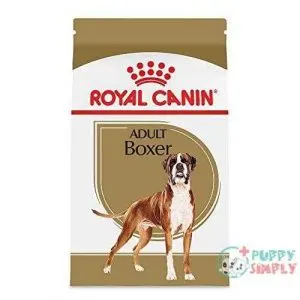
Royal Canin Boxer Adult Dry Dog Food is formulated to meet the unique needs of your energetic Boxer.
Its wave-shaped kibble is designed for easy chewing, while ingredients like L-carnitine, taurine, EPA, and DHA support muscle health and a strong heart.
This formula also promotes a shiny coat and reduces flatulence, keeping your pup happy and comfortable.
With a focus on cellular health through antioxidants, it’s a great choice for active adult Boxers, ensuring they stay healthy and full of energy every day, supporting their overall heart health.
Best For: Purebred Boxers aged 15 months and older needing tailored nutrition for muscle support, heart health, and coat quality.
- Wave-shaped kibble design aids chewing and digestion.
- Promotes shiny coat and reduces flatulence.
- Supports heart health and energy in active adult Boxers.
- Higher price compared to alternative brands.
- Monthly cost can be expensive for multi-dog households.
- Not suitable for non-Boxer breeds or puppies under 15 months.
2. Taste of The Wild Bison Venison Dog Food
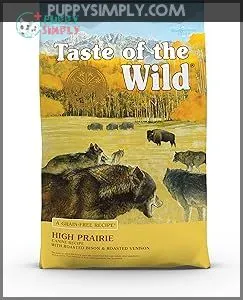
If you’re looking for a dog food that brings both quality and taste to the table, Taste of the Wild Bison Venison Dog Food could be just what your Boxer needs.
Packed with 32% bison and venison protein, it’s great for muscle maintenance.
This grain-free recipe uses sweet potatoes for digestible energy and includes omega fatty acids to keep coats shiny.
Plus, probiotics support digestion, so sensitive tummies stay happy.
While a premium choice, it’s worth it for your Boxer’s health.
Best For: Active adult dogs, including those with sensitive stomachs, needing high-quality protein and balanced nutrition.
- Grain-free formula with lean bison and venison for muscle support.
- Contains probiotics for improved digestion and gut health.
- Omega fatty acids promote healthy skin and a shiny coat.
- Higher price compared to some competitors.
- Occasional stock availability issues reported.
- Kibble size and hardness may vary between batches.
3. Grain Free High Protein Dog Food
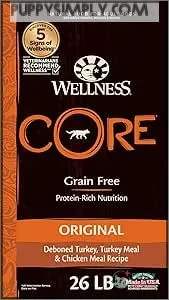
A grain-free, high-protein dog food is a solid choice for your Boxer’s energetic lifestyle.
These diets focus on quality animal proteins like turkey or fish to support strong muscles and overall health.
They’re free from common allergens like corn and wheat, which helps with sensitive stomachs or itchy skin.
Look for added omega fatty acids, glucosamine, and probiotics for joint, coat, and digestive support.
Ideal for active Boxers, this type of food promotes liveliness while keeping your pup’s dietary needs in check.
Best For: Active dogs like Boxers or those with dietary sensitivities requiring a high-protein, grain-free diet.
- High-quality protein supports muscle maintenance and energy for active breeds.
- Free from common allergens like corn, wheat, and soy, making it suitable for sensitive stomachs.
- Includes omega fatty acids, glucosamine, and probiotics for overall health benefits.
- Higher price point compared to standard dog food brands.
- Some dogs may need mixing with wet food for easier acceptance.
- Requires a slow transition to avoid digestive upset.
4. Nulo Adult Salmon Grain Free Dry Food
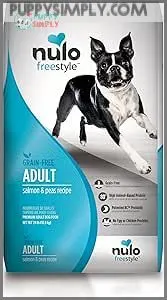
Nulo Adult Salmon Grain Free Dry Food is a fantastic pick for Boxers, offering 30% protein sourced from salmon, turkey, and fish meal.
It’s perfect for sensitive stomachs since it’s free from grains, chicken, and common allergens. Probiotics promote healthy digestion, while omega-3 and omega-6 keep their coats shiny.
This low-glycemic formula supports steady energy for active Boxers. Owners rave about firmer stools and reduced allergies.
Some owners choose grain-free options for allergy relief potential. Though premium-priced, its quality ingredients and customized benefits make it worth every penny to keep your pup thriving with steady energy and a healthy digestion.
Best For: Owners of dogs with sensitive stomachs, food allergies, or active lifestyles seeking premium, grain-free nutrition.
- High-protein formula with 85% animal-based ingredients supports lean muscle development.
- Includes probiotics for improved digestion and reduced gas in sensitive dogs.
- Omega-3 and Omega-6 fatty acids promote a shiny coat and healthy skin.
- Premium price may not fit all budgets.
- Limited flavor options compared to other brands.
- Not suitable for dogs allergic to fish or turkey.
5. Large Breed Puppy Food With Real Meat
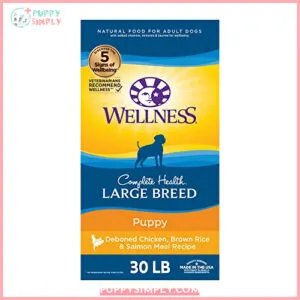
When raising a Boxer puppy, choosing a high-quality large-breed food with real meat is key.
Look for protein sources like chicken, beef, or salmon to support their muscle development and growth.
Essential nutrients like DHA, omega fatty acids, and antioxidants promote brain development, a shiny coat, and a strong immune system.
Avoid fillers like corn, wheat, or soy, as Boxers are prone to food sensitivities.
Real meat also fuels their energy and helps them mature into strong, healthy adults.
Best For: Owners of large breed puppies like Boxers needing high-quality protein-based food for growth and overall health.
- Contains real meat like chicken, beef, or salmon for muscle development.
- Includes DHA, omega fatty acids, and antioxidants for brain, coat, and immune health.
- Free from fillers like corn, wheat, or soy, reducing food sensitivity risks.
- Some brands may have quality inconsistencies across suppliers.
- Higher cost compared to generic dog food brands.
- Limited availability due to occasional supply chain issues.
6. Merrick Senior Chicken Dry Dog Food
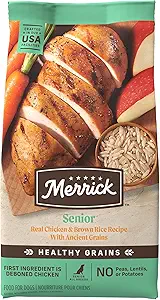
Merrick Senior Chicken Dry Dog Food is a solid choice for older Boxers needing joint and digestive support.
With real deboned chicken as the first ingredient, it’s packed with protein to maintain muscle mass.
Whole grains like quinoa and brown rice promote healthy digestion, while Omega-3 and Omega-6 fatty acids keep their coat shiny.
It also includes glucosamine and chondroitin to support aging joints, and is free from potatoes and artificial additives, making it a no-nonsense, nutrient-packed option for your senior Boxer’s golden years.
Best For: Senior dogs, especially those needing joint support and healthy digestion.
- High-quality protein from real deboned chicken for muscle maintenance.
- Includes glucosamine and chondroitin for joint health.
- Made with whole grains and probiotics for improved digestion.
- Higher price compared to similar products.
- Limited availability in smaller bag sizes.
- May not suit dogs with grain sensitivities.
7. Victor Super Premium Dog Food Nutra Pro
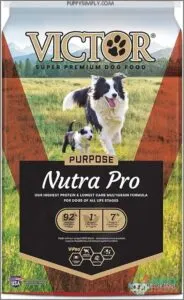
Victor Super Premium Dog Food Nutra Pro is a powerhouse option, perfect if your Boxer is bursting with energy.
Packed with 38% protein from high-quality chicken, fish, and beef meals, it’s crafted to support active dogs.
The gluten-free formula is easy on the stomach and safe for food sensitivities, offering sustained energy throughout the day.
Its VPRO Blend strengthens immunity and digestion, ensuring long-term health.
With added benefits like improved coat and stamina, Boxers thrive on this nutrient-dense, USA-made recipe.
Best For: Active dogs with high physical demands, including puppies, pregnant/nursing females, and those with food sensitivities.
- High protein content (38%) from premium chicken, fish, and beef meals.
- Gluten-free and suitable for dogs with dietary sensitivities.
- Supports immune health, digestion, and a shiny coat with added vitamins and minerals.
- May cause significant flatulence in some dogs.
- Requires odor-management measures due to gas issues.
- Not ideal for dogs with low activity levels due to high protein and energy content.
8. Natural Balance Lamb Brown Rice Dog Food
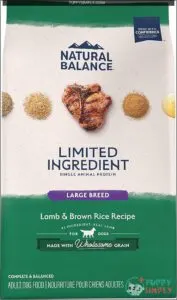
Natural Balance Lamb Brown Rice Dog Food is a solid choice for your Boxer’s health and digestion.
With lamb as the first ingredient, it provides high-quality protein to support muscle maintenance.
Brown rice offers natural fiber to aid digestion, while omega-6 fatty acids promote a shiny coat and healthy skin.
Its limited ingredient formula is perfect for sensitive stomachs, avoiding common allergens like soy and gluten.
This balanced diet supports joint, heart, and immune health—keeping your Boxer happy, active, and thriving with a shiny coat.
Best For: Large breed dogs with sensitive stomachs or allergies needing high-quality protein and balanced nutrition.
- Lamb as the first ingredient for essential amino acids and muscle health.
- Brown rice for natural fiber aiding digestion.
- No soy, gluten, or artificial flavors, suitable for sensitive pets.
- Mixed reviews on palatability, especially with picky eaters.
- Some dogs may experience temporary digestive issues during transitions.
- Higher upfront cost compared to other dog food brands.
9. Hill’s Science Diet Large Breed Mobility Dog Food
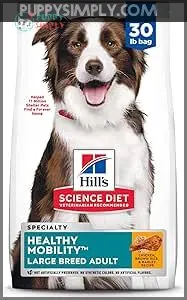
Hill’s Science Diet Large Breed Mobility Dog Food is a solid choice if your Boxer struggles with joint health or mobility issues.
Packed with natural glucosamine and chondroitin, it promotes healthy joints and cartilage.
EPA from fish oil supports mobility, showing results in just 30 days.
The recipe uses chicken meal, brown rice, and flaxseed for balanced nutrition, plus omega-6 fatty acids for a shiny coat.
While pricier, its vet-recommended quality makes it worth considering for keeping your Boxer active and comfortable, with benefits from omega-6 fatty acids.
Best For: Large-breed adult dogs aged 1-5 years with joint health or mobility concerns.
- Expensive compared to other dog food options.
- Bulk packaging can be difficult to handle for some pet owners.
- Reports of bag durability issues like punctures and tears.
- Contains glucosamine and chondroitin to promote joint and cartilage health.
- EPA from fish oil improves mobility in 30 days.
- Omega-6 fatty acids enhance coat and skin condition.
10. Taste of The Wild High Prairie Dog Food
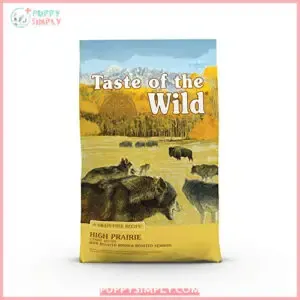
Balancing nutrition and flavor, Taste of the Wild High Prairie offers a protein-packed option for active Boxers.
With roasted bison and venison as primary ingredients, it supports lean muscle nourishment.
Omega fatty acids keep your pup’s coat shiny, while proprietary probiotics improve digestion and immunity.
However, the FDA’s concerns over diet-related cardiomyopathy and heavy use of peas warrant caution.
While its 32% protein appeals to energy needs, consult your vet before switching.
This U.S.
-made food blends quality ingredients with some debated risks.
Best For: Active adult dogs needing high-protein diets to support lean muscles and energy.
- Linked to FDA concerns regarding diet-related canine dilated cardiomyopathy (DCM).
- Heavy use of peas and legumes.
- Presence of heavy metals, pesticides, and BPA.
- High-protein formula with roasted bison and venison as primary ingredients.
- Contains omega fatty acids for healthy skin and coat.
- Includes proprietary probiotics for improved digestion and immunity.
11. Blue Buffalo Adult Dog Food Chicken Brown Rice
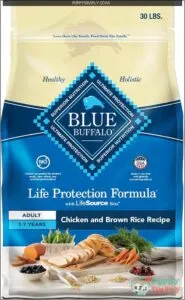
Blue Buffalo Adult Dog Food Chicken Brown Rice is a solid choice for your Boxer’s unique needs.
With deboned chicken as the primary ingredient, it provides high-quality protein for muscle maintenance. Brown rice and cranberries deliver digestible carbs and antioxidants, while omega-3 and 6 fatty acids support a shiny coat.
Boxers are prone to allergies; this food skips common triggers like corn and soy. Though highly rated, some dog owners suggest buying in-store for consistent quality.
It’s nutritious, balanced, and formulated for adult dogs, making it a suitable option for Boxer owners who want to provide their pets with a healthy diet that includes omega-3 and 6 fatty acids.
Best For: Boxer owners seeking a balanced, high-protein diet free from common allergens to support muscle maintenance and overall health.
- Inconsistent quality reported when purchased online, particularly from Amazon.
- Potential risk of encountering bad batches or counterfeit products.
- Physical packaging may vary slightly from digital representation.
- Deboned chicken as the primary ingredient offers high-quality protein.
- Free from common triggers like corn, wheat, soy, and artificial additives.
- Includes omega-3 and 6 fatty acids for coat health and antioxidants for immune support.
12. Orijen Senior Dog Food Grain Free
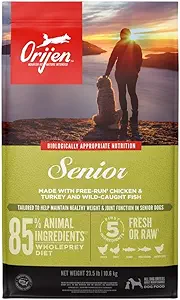
Orijen Senior Dog Food Grain Free is a fantastic choice for older Boxers.
Packed with 38% protein and 16% fat, it supports muscle maintenance and joint health.
This nutrient-dense formula mirrors your dog’s ancestral diet with WholePrey ingredients, including chicken, turkey, and fish.
It’s grain-free, making it perfect for Boxers prone to allergies or sensitivities.
Additionally, the added Omega-3s and 6s promote healthy skin and coat.
While it’s a bit premium-priced, many owners swear by its benefits for their senior pups, citing joint health as a key advantage.
Best For: Senior dogs, including large breeds like Boxers or Australian Shepherds, requiring weight management, joint health support, and a grain-free, high-protein diet.
- High protein content supports muscle maintenance and overall health.
- Includes Omega-3 and Omega-6 fatty acids for joint health and a shiny coat.
- Grain-free formula suitable for dogs with allergies or dietary sensitivities.
- Premium pricing may not fit all budgets.
- Limited availability in some regions or stores.
- High protein levels may not be suitable for dogs with certain medical conditions.
13. JustFoodForDogs Chicken Rice Wet Dog Food
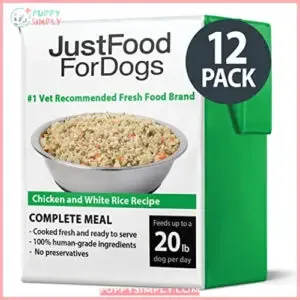
JustFoodForDogs Chicken Rice Wet Dog Food shakes things up with its human-grade ingredients, like chicken thighs, white rice, and spinach.
It’s a gluten-free option that supports growing puppies and active adults, meeting AAFCO standards for all life stages.
The gently cooked formula is easier to digest, making it great for Boxers with sensitive stomachs.
Packed in shelf-stable Tetra Pak containers, it’s convenient for storage and travel.
While more expensive, its visible, wholesome ingredients reflect the quality your Boxer deserves, with a formula that is gently cooked and meets AAFCO standards.
Best For: Dog owners seeking a human-grade, gluten-free wet food option for Boxers with sensitive stomachs or active lifestyles.
- Made with 100% human-grade, wholesome ingredients.
- Gluten-free and ideal for sensitive stomachs.
- Shelf-stable Tetra Pak packaging for convenience.
- Higher price point compared to other brands.
- Mixed customer feedback regarding quality and consistency.
- Reports of occasional issues with Amazon-sourced batches.
14. Nutro Ultra Adult Dog Food Trio Protein
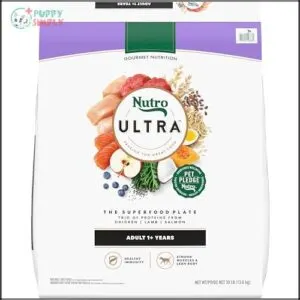
Nutro Ultra Adult Dog Food Trio Protein delivers a balanced blend of chicken, lamb, and salmon to fuel your Boxer’s high-energy lifestyle.
Packed with 14 superfoods like chia and coconut, it supports immunity, healthy digestion, and a shiny coat.
Omega-3 and 6 fatty acids guarantee your pup looks and feels their best, and this formula is free from corn, wheat, and soy, avoiding common allergens.
This nutrient-rich formula is ideal for active adult Boxers who need high-quality protein and essential antioxidants to thrive.
Best For: Active adult dogs, like Boxers, who need high-quality protein and essential nutrients to maintain energy and overall health.
- Packed with a trio of proteins (chicken, lamb, and salmon) for muscle maintenance.
- Includes 14 superfoods to support immunity, digestion, and a shiny coat.
- Free from corn, wheat, and soy, making it suitable for dogs with common allergies.
- Higher price point may not suit all budgets.
- Some dogs may reject the flavor despite its quality.
- Trace amounts of GMO material may be present due to manufacturing cross-contact.
15. Hills Science Diet Senior Small Breed Dog Food
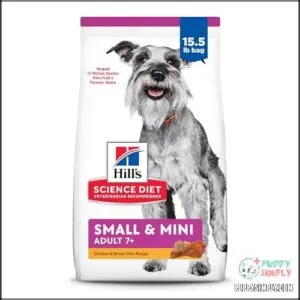
Hill’s Science Diet Senior Small Breed Dog Food is a fantastic pick for aging Boxers who need specialized care.
Though designed for smaller breeds, its balanced minerals support heart and kidney health, which Boxers often require with age.
The food includes omega-6 fatty acids and vitamin E to promote a healthy coat and skin.
Its small, highly digestible kibble guarantees easy eating and better absorption.
This formula is backed by science, guaranteeing your senior pup stays active and happy longer, with a focus on heart health.
Best For: Senior small breed dogs aged 7+ needing support for heart, kidney, and coat health.
- Promotes heart, kidney, and bladder health with balanced minerals.
- Small kibble size designed for easy digestion and eating.
- Contains omega-6 and vitamin E for skin and coat health.
- Tailored for small breeds, may not fully meet large breed nutritional requirements.
- Includes whole grain corn, which some dogs may be sensitive to.
- Coat health improvements may require additional supplements in certain cases.
16. Acana Lamb Pumpkin Dog Food
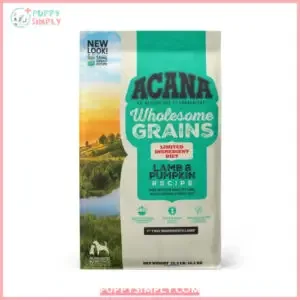
If you’re searching for a nutritious option, Acana Lamb & Pumpkin Dog Food offers hearty, limited ingredients perfect for sensitive Boxers.
With 60% animal-based proteins like deboned lamb and lamb meal, it promotes muscle health.
The fiber-rich blend of oats and sorghum supports digestion, while omega-3 and omega-6 fatty acids keep their coat glossy.
Its freeze-dried coating enhances flavor, making mealtime irresistible, and it’s free of common allergens like soy, corn, and peas, providing peace of mind for your pup’s health.
Best For: Dogs of all life stages with sensitive stomachs or allergies needing a high-quality, limited ingredient diet.
- High protein content from quality animal ingredients supports muscle health.
- Fiber-rich grains and probiotics improve digestion.
- Free from common allergens like soy, corn, and peas.
- Kibble size may not be ideal for small dogs.
- Relatively expensive compared to other brands.
- Not formulated for large breed puppy growth.
17. Open Farm Grain Free Wagyu Beef Dog Food
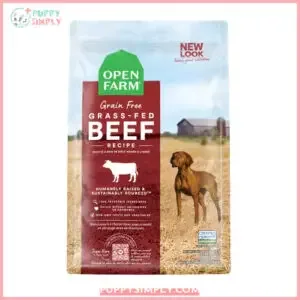
Open Farm Grain Free Wagyu Beef Dog Food stands out for its ethically sourced Wagyu beef and nutrient-packed recipe.
This grain-free formula includes wholesome ingredients like pumpkin and apples, plus omega-rich oils for a shiny coat.
Packed with probiotics and non-GMO produce, it supports digestion and overall health.
Boxers with food sensitivities will appreciate its lack of corn, soy, or artificial additives, making it a great choice for dogs with food sensitivities.
While the smaller bag size might mean frequent purchases, its premium quality makes it a worthwhile choice for your dog’s well-being.
Best For: Dogs with sensitive stomachs or food sensitivities who need a high-quality, nutrient-dense, grain-free diet.
- Made with ethically sourced Wagyu beef and non-GMO ingredients.
- Supports digestive health with probiotics and nutrient-rich superfoods.
- Free of corn, soy, artificial additives, and common allergens.
- Smaller 11-pound bag requires frequent repurchasing.
- Strong fish smell despite being beef-based may not appeal to all.
- Premium pricing may be a concern for budget-conscious owners.
18. Portland Pet Food Mixed Wet Dog Food
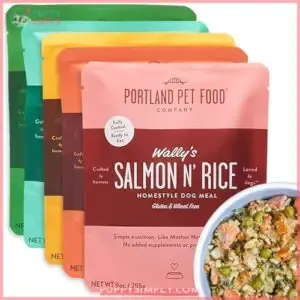
Portland Pet Food Mixed Wet Dog Food is a versatile option, ideal for Boxers of all life stages.
With simple, human-grade ingredients sourced in the USA, this food is both nutritious and easy to digest.
The ready-to-serve pouches are perfect as a meal, mixer, or topper, making them convenient for busy pet parents.
Your Boxer will enjoy the real-meat flavors, while the limited ingredients reduce allergy risks.
It’s a bit pricey but worth it for picky eaters or sensitive tummies, especially considering the human-grade ingredients.
Best For: Busy pet parents with Boxers of all life stages, especially picky eaters or those with sensitive stomachs.
- Higher price point compared to other options.
- May not be economical for large dogs or multi-dog households.
- Some flavors may cause digestive issues.
- Human-grade, USA-sourced ingredients ensure high quality.
- Convenient, ready-to-serve pouches usable as meals, mixers, or toppers.
- Limited ingredients reduce the risk of allergies.
Choosing Boxer Dog Food
Choosing the right food for your Boxer means focusing on high-quality protein, balanced nutrients, and their specific life stage.
You’ll want a formula that supports their energy, muscle health, and overall well-being.
Importance of High-Quality Protein
High-quality protein is essential for muscle development and maintaining energy levels in Boxers.
Animal-based proteins provide essential amino acids for boxer muscle gain and immune function. Look for high-protein boxer food with a strong protein percentage for ideal dog food and muscle mass support.
Prioritize protein digestibility, ensuring your Boxer absorbs nutrients effectively for daily vitality and strength. This will help support muscle development and overall health.
Considerations for Large Breed Dogs
Boxers, as large breed dogs, need food suited to their size and energy levels.
Look for:
- Joint Support: Glucosamine and chondroitin help prevent hip disease.
- Calorie Control: Balanced diets avoid obesity, a risk for adult Boxers.
- Skeletal Health: Proper calcium levels are key for large breed puppies’ growth rates.
Choosing large breed dog food respects their breed-specific needs!
Life Stage and Activity Level
Choosing the right food depends on your Boxer’s stage and energy levels.
Puppy energy needs growth-focused boxer puppy food, while adults thrive on maintenance formulas for active Boxers.
Seniors need lower-calorie meals to support weight management and reduced senior activity.
Dietary adjustments like higher protein for energy or supplements for joints guarantee your dog stays healthy and happy throughout life.
Boxers also benefit from food with high protein content.
Frequently Asked Questions (FAQs)
What is the best dog food for a boxer?
Feeding your boxer right is key!
Choose high-protein, grain-inclusive foods like Wellness Complete Health or grain-free options like Taste of the Wild.
Focus on joint-friendly nutrients like glucosamine and DHA to keep them active and thriving.
What are the top dog food options for dogs?
Look for brands like Taste of the Wild, Wellness, and Royal Canin that focus on balanced nutrition, high-quality proteins, and joint support.
Prioritize grain-inclusive or limited-ingredient formulas, depending on your dog’s sensitivity and needs.
Which dog food is best for boxers with allergies?
A stitch in time saves nine—opt for FirstMate Limited Ingredient Diet or Acana Singles Lamb & Apple.
Both provide allergy-friendly, grain-free recipes with high-quality proteins and limited carbs, protecting your Boxer’s sensitive stomach and skin.
What is the best wet food for Boxer puppies?
The Honest Kitchen One Pot Stews is a great wet food for Boxer puppies.
It’s human-grade, packed with 4% protein, and supports growth with simple, nourishing ingredients ideal for sensitive stomachs.
What is the best dehydrated dog food for boxers?
Picture a meal that feels home-cooked—The Honest Kitchen Dehydrated Dog Food fits the bill.
It’s human-grade, nutrient-dense, and gentle on Boxers’ sensitive stomachs.
With quality proteins and essential nutrients, it supports their active lifestyle perfectly, making it a great choice for a home-cooked meal.
Can boxers eat dog food?
Yes, boxers can eat dog food, but you’ll want to choose one that’s specially formulated for their needs.
Look for high-quality proteins, healthy fats, and nutrients supporting joint, heart, and overall health.
Does a boxer need to eat special dog food?
Does your Boxer deserve special food? Absolutely!
Their high energy, food sensitivities, and health risks mean they thrive on large-breed formulas with quality protein, omega-3s, and joint-friendly nutrients.
A customized diet keeps them happy and healthy.
What are the 3 feeding stages of a boxer’s life?
The three feeding stages of your boxer’s life are puppy (0-15 months), adult (15 months-7 years), and senior (7+ years).
Each stage requires specific nutrition to support changing energy levels and health needs.
What’s the best dog food for an older boxer?
With 80% of senior Boxers developing joint issues, you’ll want foods rich in glucosamine and omega-3s.
Royal Canin Mature, Hill’s Science Diet Senior, and Wellness Complete Health Senior provide excellent nutrition for your aging companion.
When can I safely switch my boxer puppy to adult food?
You should switch your boxer puppy to adult food around 18-24 months of age.
Their growth plates need time to develop properly, and they’ll benefit from puppy formula’s higher protein content until fully mature.
Conclusion
Picture your Boxer wagging happily at mealtime with the perfect food in their bowl.
Finding the best dog foods for Boxers doesn’t need to be overwhelming—just focus on quality proteins, healthy fats, and appropriate life-stage formulations.
Whether you choose Royal Canin’s breed-specific option or Taste of the Wild’s protein-rich formula, you’re investing in your pup’s health.
Trust your instincts, watch how your dog responds, and you’ll find the best dog foods for Boxers that keep them thriving for years.
- https://americannaturalpremium.com/breed-guide/best-dog-food-for-boxers/
- http://www.irishfowl.com/talk/topic-24541.html?c=1
- https://www.royalcanin.com/us/dogs/products/retail-products/boxer-adult-2588
- https://www.boxerforums.com/threads/recommend-dog-food.207175/
- https://boxerworld.com/forums/pages/choosing-a-good-kibble-dry-dog-food/

